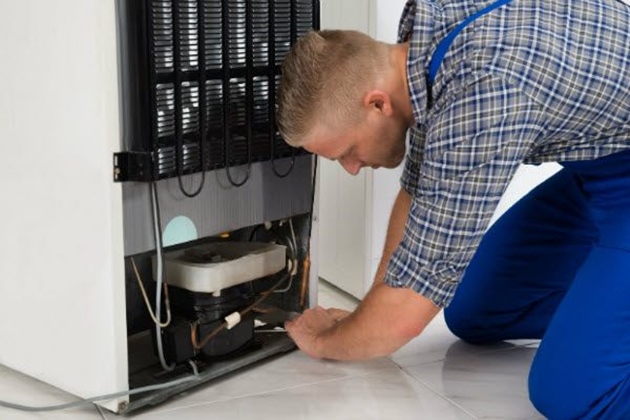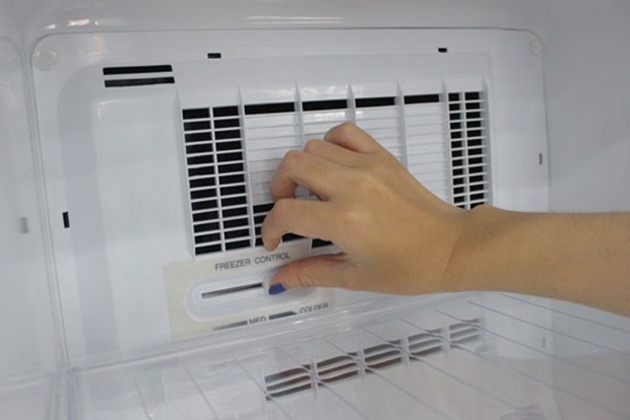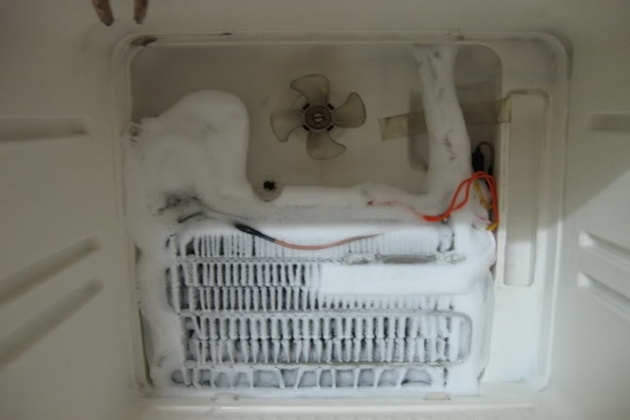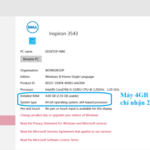If your fridge is making loud noises and experiencing issues such as not cooling properly, ice maker not working, or not making ice, you should call a repair technician.
However, if you can identify where the noise is coming from (for example, from the compressor) and its frequency, you can diagnose and troubleshoot this loud fridge problem on your own.
1. Clattering noise coming from the bottom of the fridge
If you hear clattering noise coming from the bottom of the fridge, the culprit is likely the drip tray. This is the tray that collects water condensation located directly beneath the fridge’s bottom and usually mounted on a foam rubber layer to prevent vibration and noise when the fridge is running. During use or when moving to a different position, it may shift and come into contact with the cooling line or condenser coil. When the fridge operates, it will vibrate and create noise.

Illustration
To fix this, secure the drip tray firmly. The tray should be positioned below the fridge and about an inch above the floor.
2. Noise coming from the back of the fridge
The loud noise coming from the back of the fridge could be due to the condenser fan or the compressor.
If you determine that the noise is caused by the condenser fan, try troubleshooting by cleaning any dust and debris that may have accumulated between the fan blades using a soft brush.

3. Noise coming from the freezer compartment
If you hear noises like squeaking or rattling from inside the fridge, it could be the air circulation fan of the freezer compartment being dry or being obstructed by oil or trapped dead animals in the fan blades.
To fix this, remove all food items, remove the plastic partition wall, and look inside to find the fan motor. Remove the fan motor, lubricate it with oil or grease, and reinstall it. The noise will stop. If the problem persists, you should call a technician to replace the fan.

4. Fridge making knocking noise
If your fridge makes a knocking noise, it may indicate that the refrigerator’s fan motor is not functioning properly. The fan may be overheated or running too fast.
To fix this, check the fan motor similar to the previous step.
5. Faulty ice dispenser solenoid
A loud fridge can also be caused by a faulty ice dispenser solenoid, preventing the fridge from defrosting, causing ice and frost to accumulate on the evaporator coil, fan blades, and fan box.
To fix this, replace the solenoid with a new one to activate the ice defrosting operation when the evaporator coils are frost-covered.

6. Loose mounting screws
If your fridge makes a “re re” knocking noise, similar to loosened screws touching each other, you can fix it by checking if the fridge’s mounting screws are loose or misaligned. If they are, resecure them.
7. Fridge making wind-like noise
A fridge operates on a cyclic basis, turning off when it reaches the desired cooling temperature and automatically turning back on when the cooling temperature has not reached the set level. During this time, the fan motor, compressor, and evaporator coil operate, causing a “whoosh” noise. However, this is normal machine noise, and it usually doesn’t last long.
8. Regular noise variations depending on fridge models
A loud noise coming from the fridge is not something to worry too much about. Models without defrosting tend to make louder noises during operation because the defrosting solenoid operates to defrost the coils, causing a “clattering” noise. However, this is normal machine noise and does not usually last long.
Larger fridges with higher capacities also tend to make louder noises than smaller fridges with lower capacities.
Notes when checking and troubleshooting unusual fridge noises
– Disconnect the fridge’s power before disassembling or checking the parts that emit loud noise. Use a voltage tester to check if any parts are leaking, and do not touch exposed wires while the fridge is plugged in.
– Read the disassembling procedure carefully to disassemble the parts one by one. Arrange the parts that have been removed in an organized and scientific manner for easy reinstallation in the correct sequence.
– Clean the parts thoroughly and let them dry before reinstalling to prevent electric shock due to water contact.
– It is recommended to call a service center or a professional technician to fix any issues related to loud noises and unstable cooling and freezing system.




































